Final Report: 23rd Congress of the IAHR Asia and Pacific Division
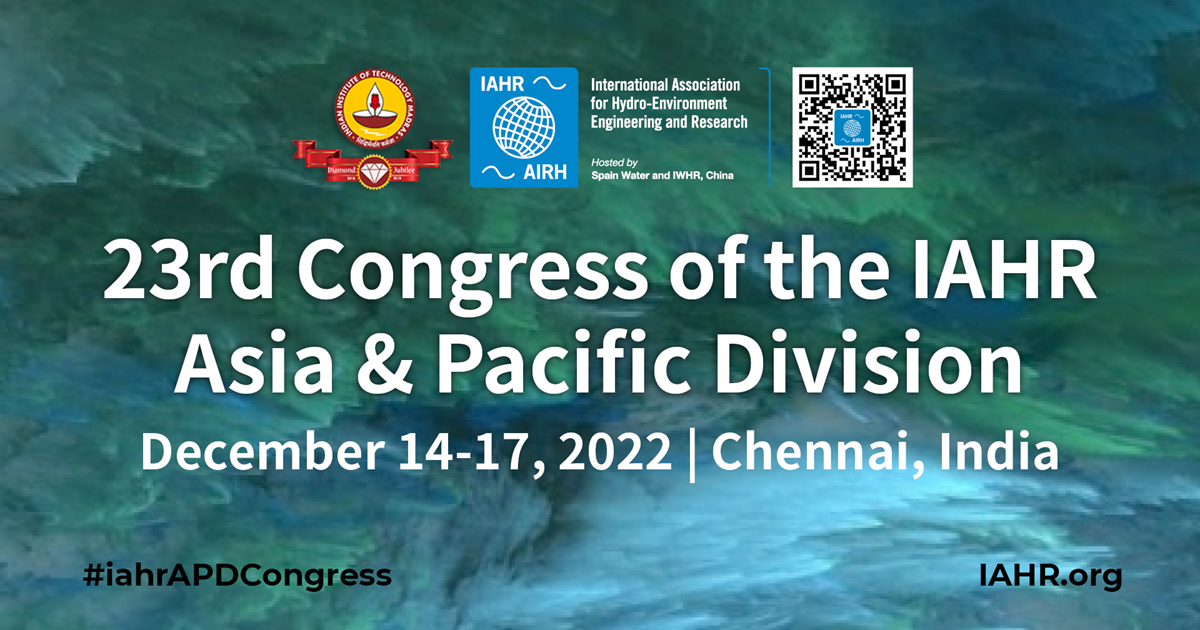
The central theme of the 23rd Congress was Water -- From Land to Sea -- Conservation and Management. The Asia-Pacific region has been experiencing floods and water problems, forcing researchers to work towards conservation and mitigation and cope with the climate change effects on the water resources.
The 2015 flood in Chennai and the recent mammoth floods in China are examples. The sedimentation hampering smooth transport through navigable rivers, closure of river mouths and coastal erosion are perennial problems needing attention. Climate change adds a new dimension to the problems mentioned above. The 23rd IAHR APD Congress provided an excellent forum for exchanging ideas and experience among scientists, engineers and researchers with a common interest in water environment and hydraulic problems. The congress brought together over 156 global experts to work towards conservation and mitigation and cope with the climate change effects on water resources. Participants from about 15 countries took part in this event for knowledge transfer of the engineering know-how in hydro-environmental engineering and research.
The objective of this Conference was threefold:
To foster discussion and strengthen connections between experts and policymakers of the World's scientists, engineers, and researchers, and create a virtual think tank for further deep policy analysis, scenario planning, and forecasting on World's future Water and Ocean conservation and management policy choices.
To allow foreign academics from Germany, Singapore, Japan, Canada, Australia, Indonesia, Korea, China, Sri Lanka, Bangladesh, and New Zealand to discuss some of the Hydro-Environment research themes with their Indian counterparts.
To sponsor the creation of a series of targeted policy briefs on the World's future Water and Ocean conservation and management policy to provide contestable policy advice and deep policy analysis.
Conference Format
The four-day event included a day for pre-conference workshops. The congress had two pre-conference workshops, three plenary sessions covering keynote speeches delivered by eminent world-renowned scientists and academicians, 20 parallel sessions, two technical tours and social programs. Over 156 delegates from 15 countries across the World attended the conclave on the theme Water - From Land to Sea - Conservation and Management. A total number of 102 papers have been presented, spanning 20 sessions under two major categories surface and river hydraulics and maritime hydraulics. The 20 parallel sessions had 4-5 speakers per session, and each speaker was given 12 minutes to present, followed by 3 minutes for questions and discussions.
The three plenary sessions were scheduled on the first and last days of the Conference with total of 7 keynote speakers, and each speaker was given 30 minutes to present. The seven Keynote speakers came from India (2), Japan (1), Singapore (1), Australia (1), Germany (1) and Canada (1) and discussed maritime river hydraulics from various perspectives. Prof. Jain S. K. from India talked about the inter-state disputes involving water, an important water resources problem in a vast country like India. Prof. Mujumdhar P. P. from India and Prof. Holger Schuttrumph from Germany highlighted the importance of exacerbating of flooding problem due to climate change in countries belonging to both the global south and global north via the examples of India and Germany, respectively. Further, Prof. Norio Tanaka from Japan discussed flood mitigation measures by vegetation. Prof. Alexander V. Babanin from Australia presented the influence of free surface ocean waves on the weather and climate. Prof. Ram Balachandar from Canada highlighted the importance of understanding turbulence in open 8 channels. Prof. Adrian Wing Keung Law from Singapore addressed the challenges in water quality monitoring over a large area through UAVs.
The Conference was structured to foster discussion between participants around the core themes of the Conference. This was achieved by hosting small group debates and larger group discussions on pre-prepared questions following each session. On each day of the Conference, one hour for lunch and 30 minutes for morning and afternoon tea were allotted to allow participants to continue their discussions after each session. Time was allocated at the end of each day for a group reflection on the day's discussions.
Opening Ceremony
The opening ceremony of the 23rd Congress of the IAHR-APD started with the invocation of Tamil Thai Valthu and Vande Mataram. The opening session was addressed by Prof. S. A. Sannasiraj, Organising Secretary of the 23 rd Congress of the IAHR-APD, who declared the Conference officially opened at the end of his statement. Highlighting the importance of this Conference, Prof. Sannasiraj said, "While we address the traditional hydraulics in the deliberation, the highlight of the event is addressing the problems of climate change in water security and flooding and in particular coastal problems too". Further, he said, "the role of modern materials such as geotextiles and fibres reinforced systems in various applications of the water sector is inevitable." Prof. S. Nallayarasu, Head of the Department of Ocean Engineering, IIT Madras, then delivered a speech on the scope of the event.
Prof. Joseph Hun-Wei Lee, President of IAHR, addressed the gathering, which was followed by Dr. Gregory Shahane De Costa, Chair, IAHR-APD. Dr. De Costa said, "I am certain that this congress, with its research papers and in-depth discussions, will contribute for the advancement of scientific research and communities. The success of any organisation or congress revolves around its participants, and I thank you for all your participation. " Mr. Sunil Paliwal, Chairperson of Chennai Port Trust, inaugurated the congress as the chief guest of the opening ceremony.
Addressing the inaugural session of the Conference, Mr. Paliwal said, "IIT Madras has worked extensively with the Government to solve problems. There were lots of concerns about the location of a captive jetty for Indian Oil Corporation Limited in the Kamarajar Port in Ennore. The NTCPWC of IIT Madras, which has a simulator, conducted various simulations in the presence of IOC personnel for various wind speeds, directions, wave heights and IOC after these simulations got convinced of the location allotted. This is an example where academic has helped to solve problems in the field. I am sure these deliberations will go a long way in enriching the knowledge of all the participants."
Delivering the presidential address, Prof. Raghunathan Rengaswamy, Dean of Global Engagement, IIT Madras, said, "Organising a conference and getting the best people from all over the world to the campus is an important academic activity. IIT Madras is a vibrant institution hosting many such conferences. On climate change and sustainability, more than journals and articles, even our lived experiences tell us that things are changing. " Further, a book on Coasts and Estuaries authored by Prof. V. Sundar, Prof. S. A. Sannasiraj and Prof. K. Murali and published by World Scientific, Singapore, was released during the inauguration.
Prof. B. S. Murthy, Joint Organizing Secretary of the 23rd Congress of the IAHR-APD, proposed the vote of thanks. The Conference's opening ceremony concluded with invoking the India National Anthem.
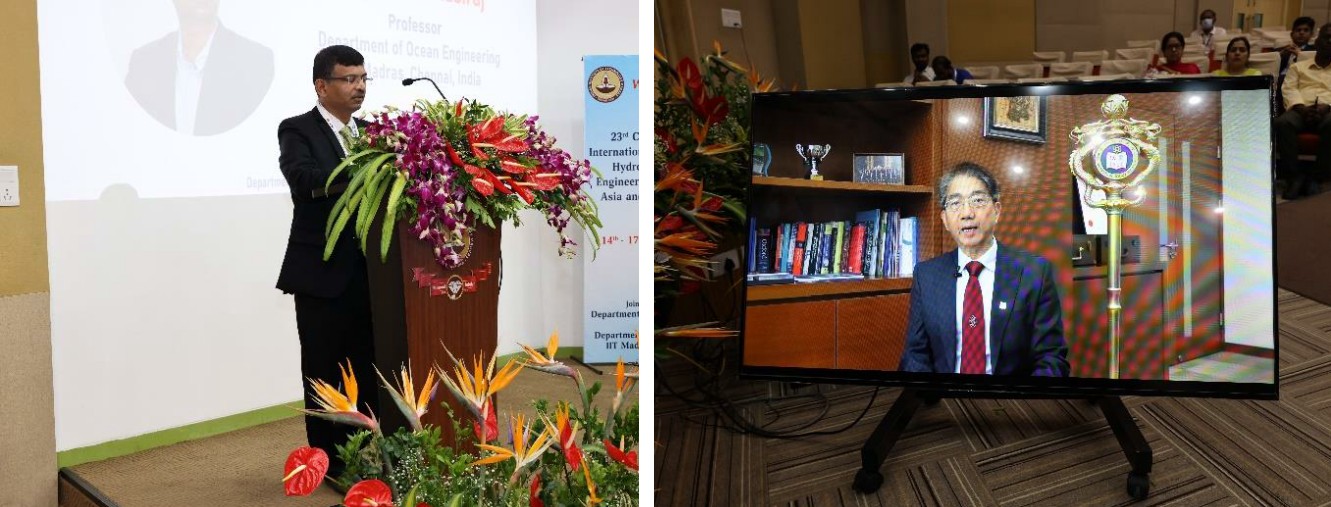
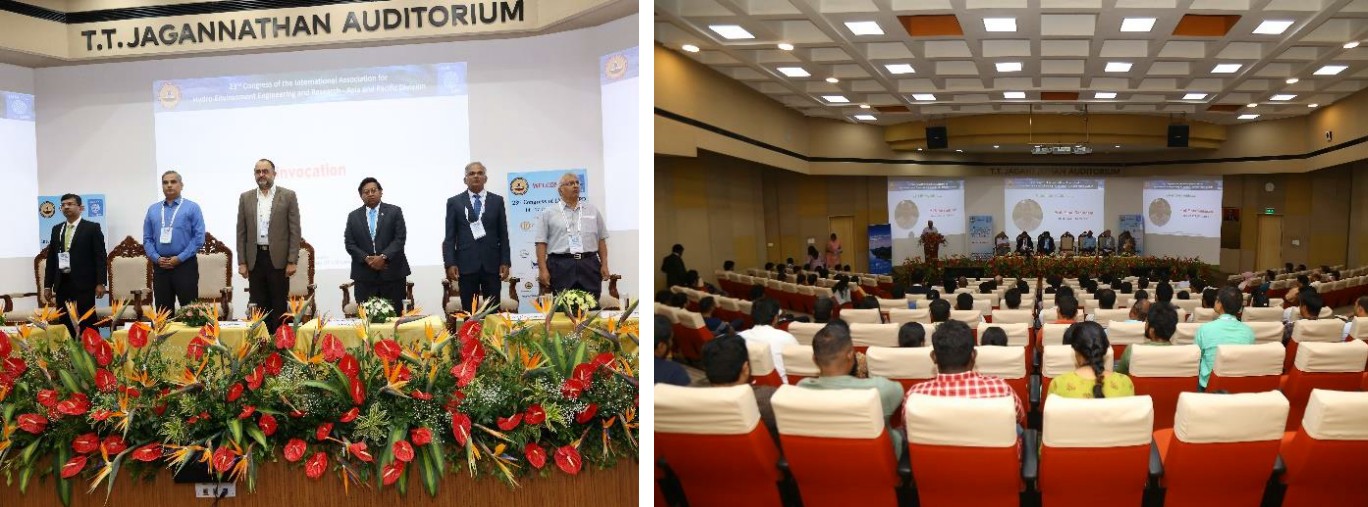
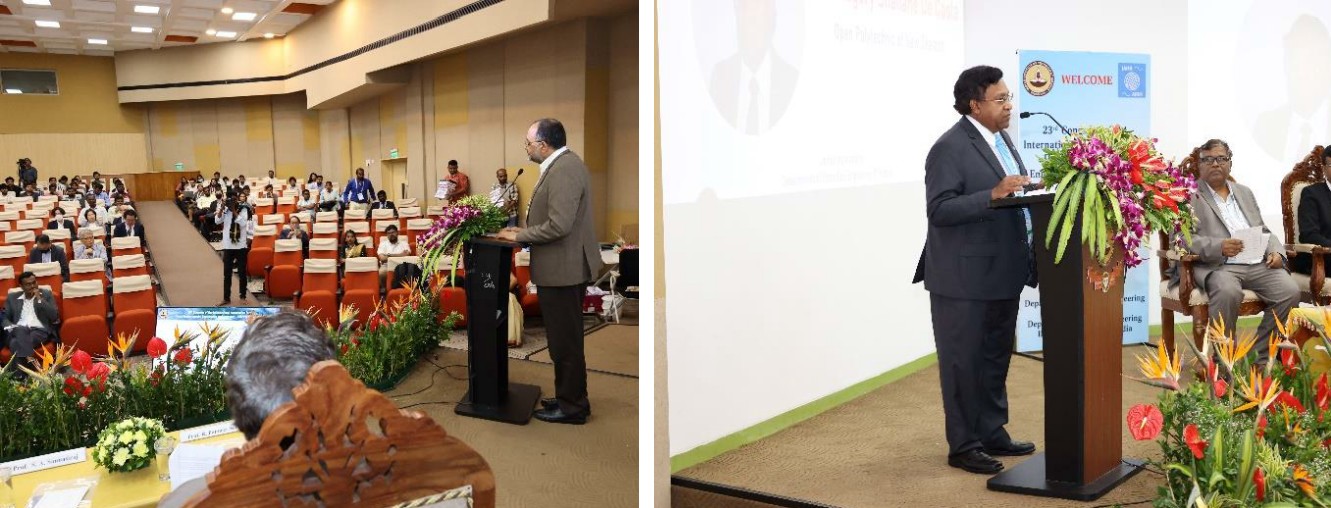
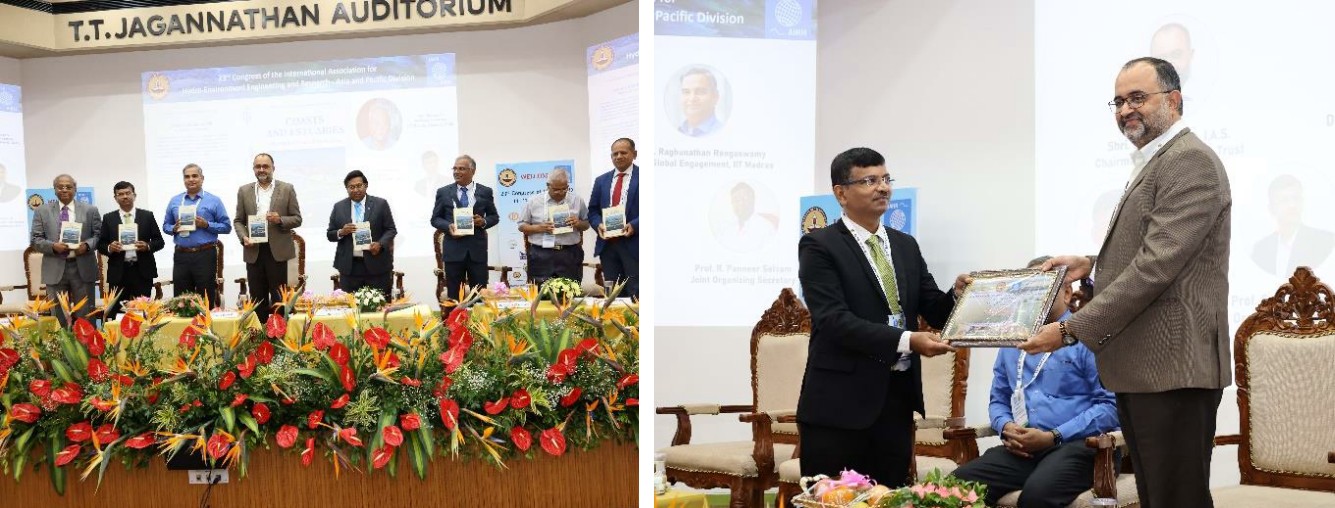
Plenary Sessions
i) Plenary Session-1
The first plenary session followed the opening ceremony and had three talks.
Prof. V. Sundar of IIT Madras chaired the first plenary session. Prof. Hyoseop Woo, Gwangju Institute of Science and Technology, Korea, gave a brief overview of the IAHR book on the History of Water. It was followed by Prof. K. Murali, IIT Madras, who talked about the National Technological Centre for Ports, Waterways and Coasts. Prof. Norio Tanaka, Saitama University, Japan, delivered the first keynote address. His keynote address focused on the Hybrid Defence system for Inundating Tsunami currents or overbank flow from the river.
ii) Plenary Session-2
The second plenary session was held on the 14 th of December 2022 at 15:50, and Prof. Radiant Triatmadja, Universitas Gadjah Mada, Indonesia, chaired it. The second plenary session had two keynote addresses by Dr.-Ing. Holger Schüttrumpf, RWTH Aachen University, Germany and Prof. Alexander V Babanin, University of Melbourne, Australia. Dr.-Ing. Holger Schüttrumpf's shared the experiences and observations from the Flood Disaster 2021 in Germany. The second keynote address by Prof. Alexander V Babanin brought forth several aspects of the ocean waves as a link between metocean time scales in terms of turbulence, waves, weather, climate and also between environments concerning deep water, coasts, and marginal ice zone.
iii) Plenary Session-3
The third plenary session was held on the 16th of December 2022 at 11:00 AM and was chaired by Prof. Mukund Babel, Asian Institute of Technology, Bangkok, Thailand and had four keynote addresses. In his talk, Prof. Adrian Wing-Keung Law, NTU, Singapore, gave an overview of UAV-based remote sensing of water quality in coastal environments for engineering applications.
Prof. Mujumdar P. P., IISc Bangalore, India, focused on the emerging hydrologic challenges of urban floods in India. It was followed by the keynote address of Prof. Ram Balachandar, University of Windsor, Canada, who discussed the need for and characterisation of fully developed flow in open channels. The final keynote address was on the applications of systems analysis techniques to resolve Inter-State water sharing disputes, and Prof. Jain S. K., IIT Roorkee, India delivered it.
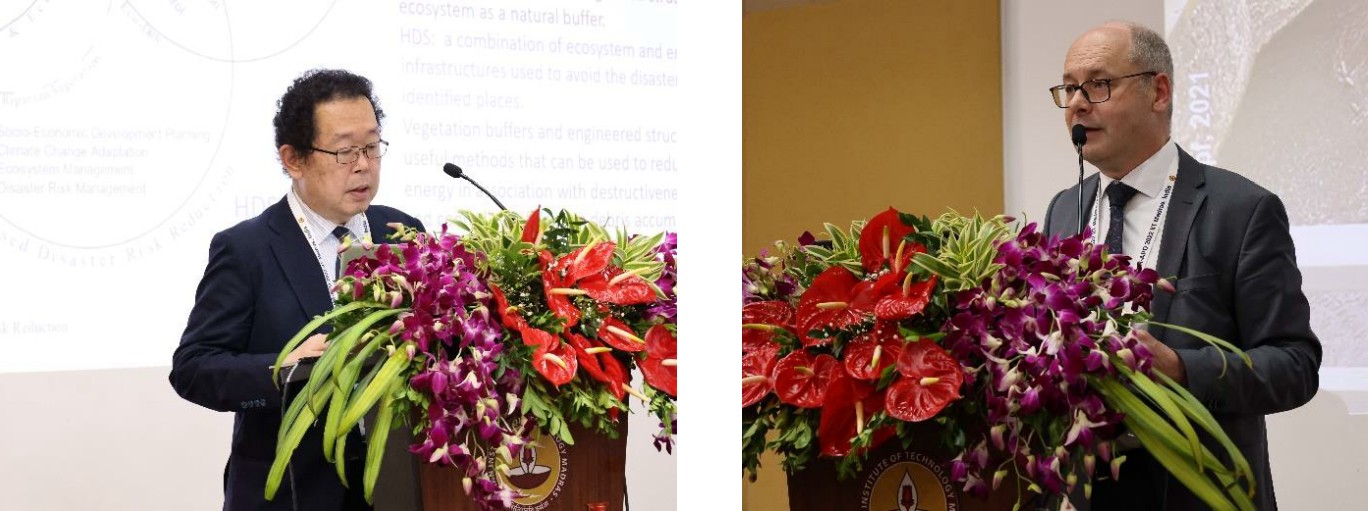
Prof. Norio Tanaka (Japan), Dr.-Ing. Holger Schuttrumpf (Germany)
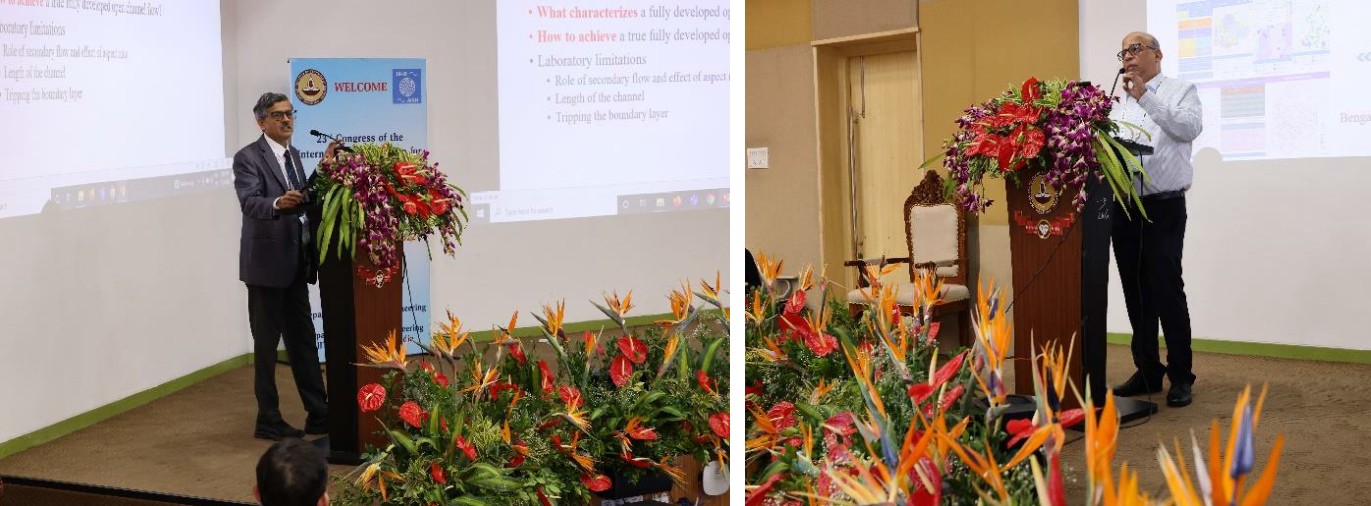
Prof. Ram Balachandar (Canada), Prof. Mujumdar P. P. (India)
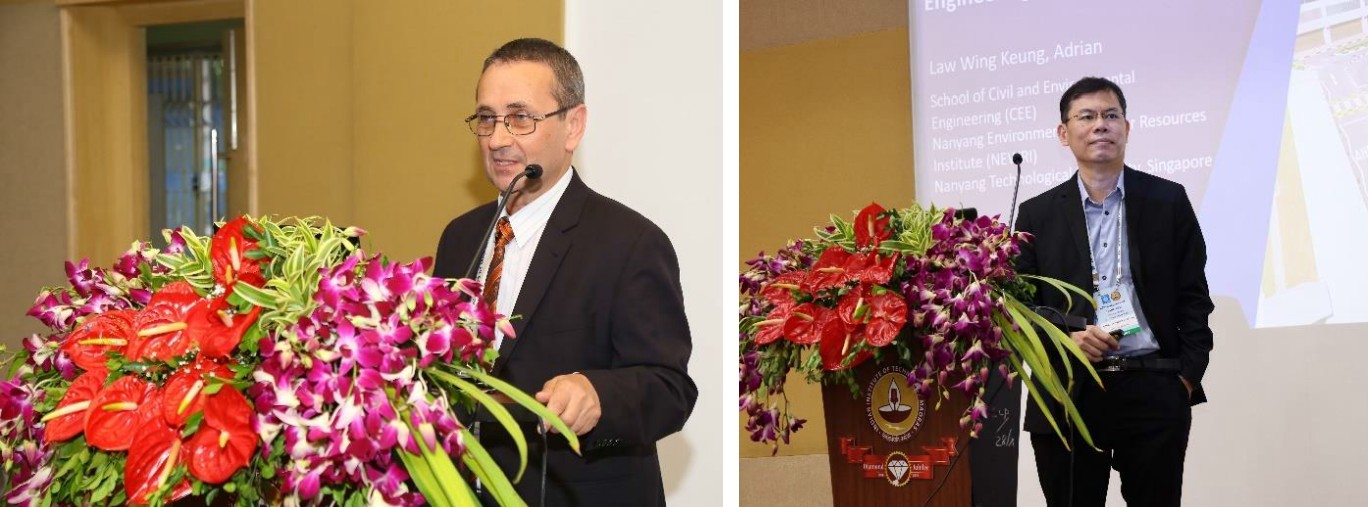
Prof. Alexander V. Babanin (Australia), Prof. Adrian W-K Law (Singapore)
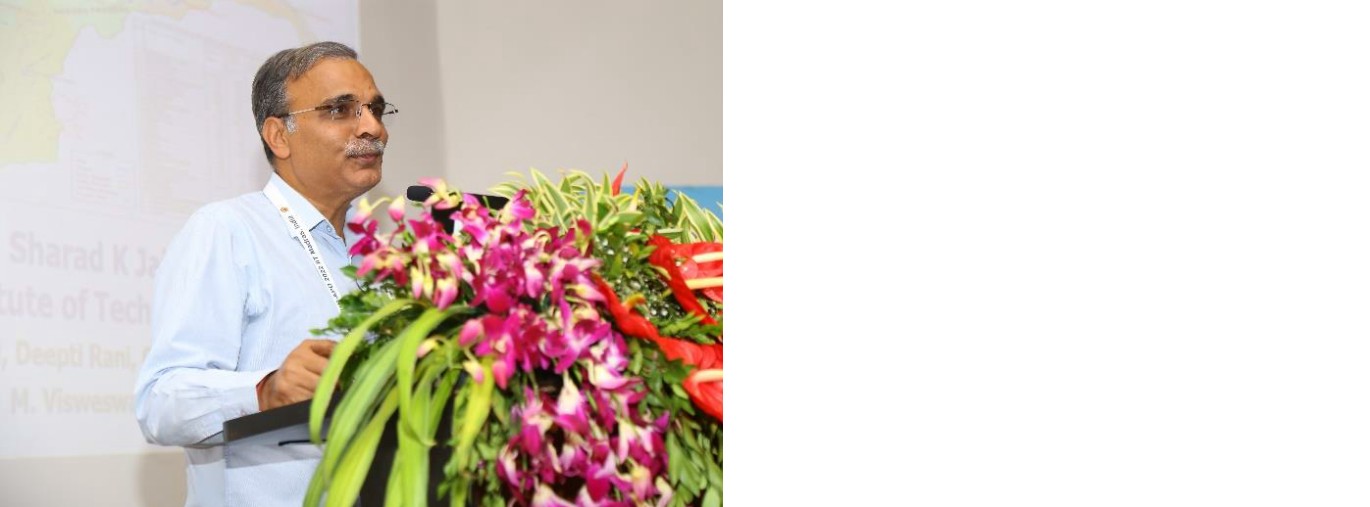
Prof. Jain S. K. (India)
Special Sessions
Two special sessions were part of the 23rd Congress of the IAHR-APD. The first special session was held on the 14th of December 2022 at 16:50 hours. The theme of this session was Coastal Engineering, and it was held in honour of Prof. V. Sundar, IIT Madras, former president of IAHR-APD. This special session had seven invited talks by Prof. Balaji, IIT Bombay, Mr. P. N. Ananth, Vice President and Head of Energy and Marine Department, COWI India (P) Ltd., Dr. P. V. Chandramohan, President: Technical, Navayuga Engg. Co. Ltd., Dr. Sundaravadivelu, Professor Emeritus, IIT- Madras, Dr. Sheela Nair, NCESS, India, Dr. Kumaran Raju, Principal Scientist, NTCPWC and Mrs. Suganya, Senior Engineer, NTCPWC. Prof. S. A. Sannaisraj and Dr. V. Sriram moderated this special session.
The theme of the second special session was Water Security and Climate Adaptation. It was held on the 16th of December 2022 at 13:50 hours. This special session was chaired by Dr. Yuko Ishida and had six presentations. This session started with the invited talk from Prof. Mukand Singh Babel, AIT, Thailand. This session covered a wide range of topics on qualitative assessment for water management of water management for different river basins, specifically under climate change and considering future extreme events.
Parallel Sessions
The 23rd Congress of the IAHR-APD comprised of 20 parallel sessions covering a wide range of topics. Five parallel sessions were on the theme of Maritime Hydraulics, with a total of 25 presentations. The topics covered in these sessions included estimation of shoreline changes, improvements of wave energy converters, effects of cross-currents on inland vessel movement, dredging practices, modelling the effects of cyclones on sediment transport etc. Four sessions were on Environmental Management, covering the aspects of groundwater contamination, socio-economic impacts of flood events and fluid ecologies. Further, four parallel sessions were on surface water resources covering the concepts of in-stream and floodplain and mining impacts, integrated surface-subsurface flow systems, and inverse groundwater modelling to estimate aquifer parameters and anthropogenic changes on river ecosystems. The other themes included river hydraulics, climate change, computational hydraulics and statistical methods.
Valedictory Function
The valedictory function of the 23rd Congress of the IAHR-APD was held on the 16th of December 2022 at 15:30 hours. It started with the invocation of Tamil Thai Valthu and Vande Mataram. Prof. B. S. Murty gave the welcoming address for the valedictory function. Following this, concluding the successful organisation of this Conference, Prof. S. A. Sannasiraj said, "Apart from a number of distinguished delegates, the 23 rd IAHR APD was star-studded as the IAHR Vice President, The Chairman and secretary general of IAHR-APD and four members of Executive Committee of the APD-IAHR participated in it."
Prof. S. Nallayarasu, Head of the Department of Ocean Engineering, IIT Madras, then delivered the presidential address of the event. Prof. Manu Santhanam, Dean IC&SR, IIT Madras, gave the valedictory address as the chief guest of the function. An Award ceremony followed this, and a total of five awards were given to the participants. Two best student paper awards were given, along with three other best paper awards.
Best Paper Awards
Best Student Paper Award
Mainak Chakraborty – "Numerical Modelling of Ship Waves and Induced Sediment Resuspension in the Hooghly River, India"
Ryotaro Endo – "Eliminating Fixation of Alternate Bars by using Impermeable Groynes"
Best Paper Award
B. Sridharan – "Combined Storm Surge and River Flow Simulation for the Hooghly Estuary, East Coast of India."
N. Hari Ram – "Numerical Investigations into Wave Attenuation Characteristics of Vegetation Belt in terms of Vortex Shedding due to Different Arrangement Configuration"
Overall Best Paper Award
Shaswat Saincher – "Application of IITM-RANS3D to Wave-Breaking and Wave Structure Interaction Problems"
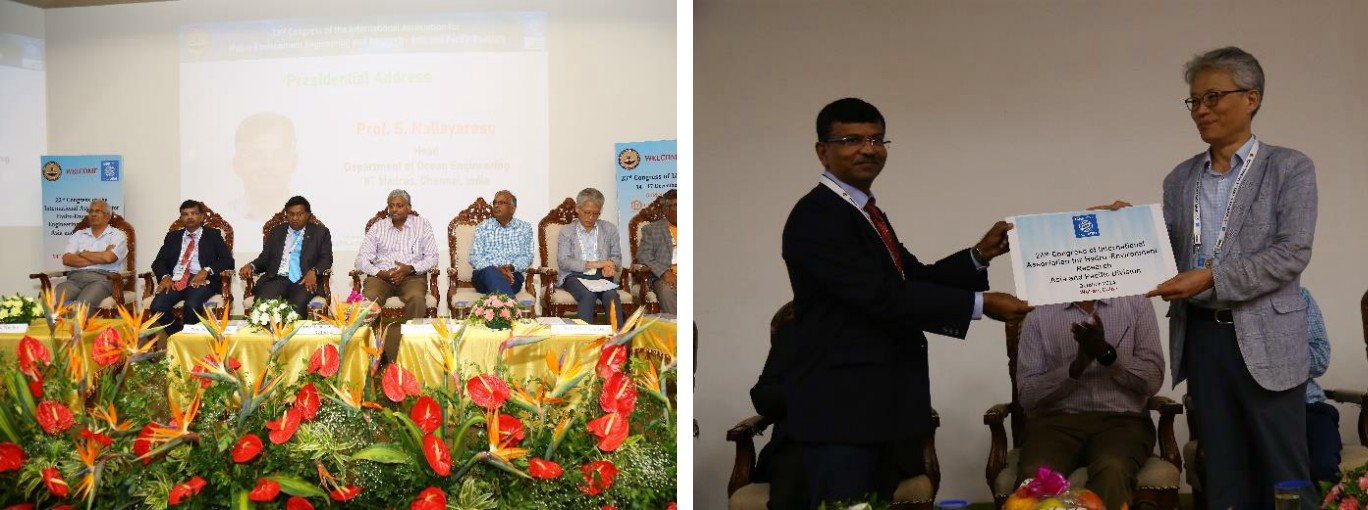
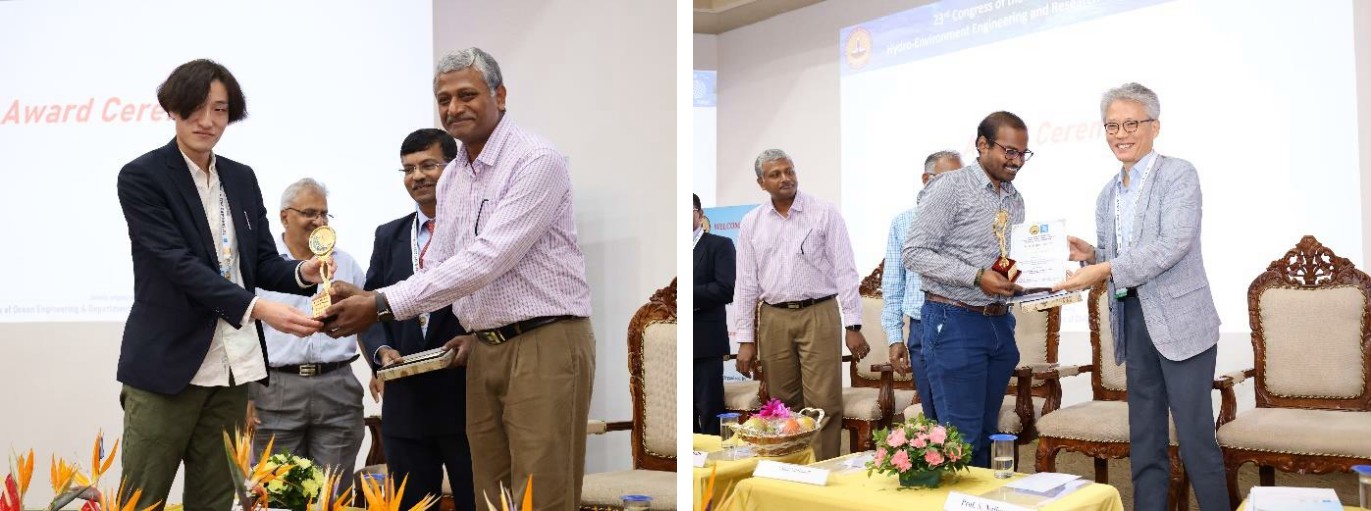
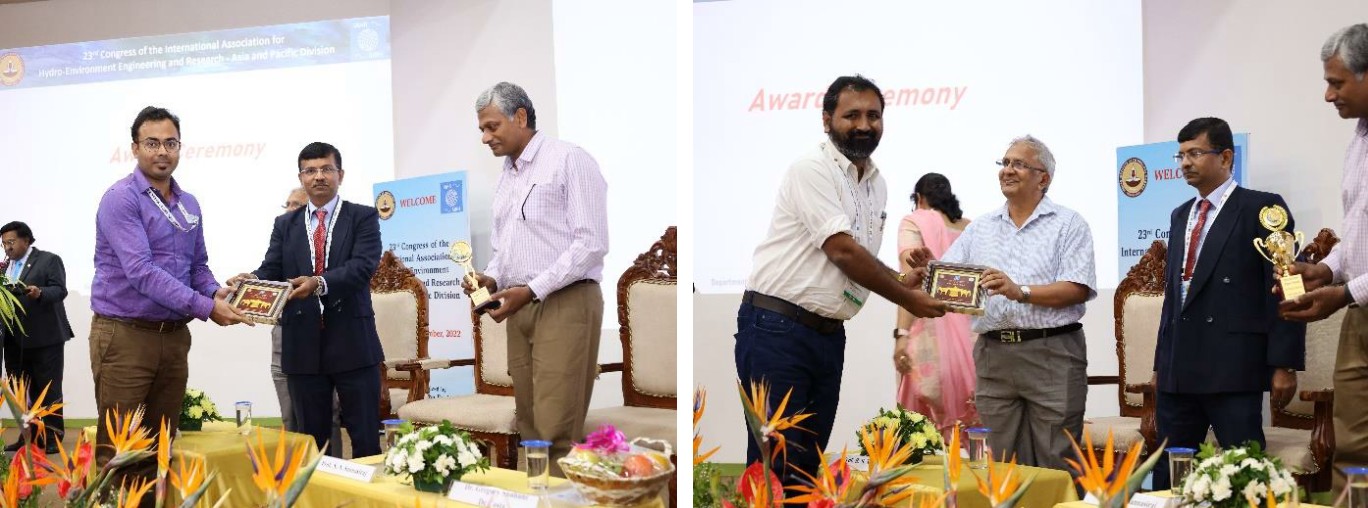
Registrations
Registration for the Conference was open to students, academics, sponsors/exhibitors, and India's government officials working on and researching Hydro-Environment and Ocean Engineering. In total, 156 persons registered for the Conference. This included 142 paying attendees and 9 conference sponsor attendees. Five persons participated in the Conference virtually. Registered attendees included academics and students from various Indian academic institutions, Germany, Indonesia, Sri Lanka, Bangladesh, Korea etc. Complimentary attendees included the IAHR-APD president, executive committee members, keynote speakers, and conference organisers.
Student Involvement
To encourage student participation in the Conference, students were supported to attend through travel grants, complimentary attendance awards, and subsidised registration costs. Students or emerging scholars accounted for approximately two-thirds of the participants. Two best student paper awards were given along with three other best paper awards.
Technical Tours
The technical tours were scheduled on the second day of the Conference, i.e., on the 15th of December 2022. There were two different technical tours. These technical tours included prominent tourist attractions, UNESCO world heritage sites, and major hydraulic structures like Anicut and Dam. The technical tour-1 included Porur lake, the Institute of Hydraulics and Hydrology (IHH), Thamaraipakkam Anicut and Marina Beach. The technical tour-2 included Vayalur check dam, Kovalam beach and Mamallapuram shore temple. All the participants were allowed to select their technical tour option based on their interest.
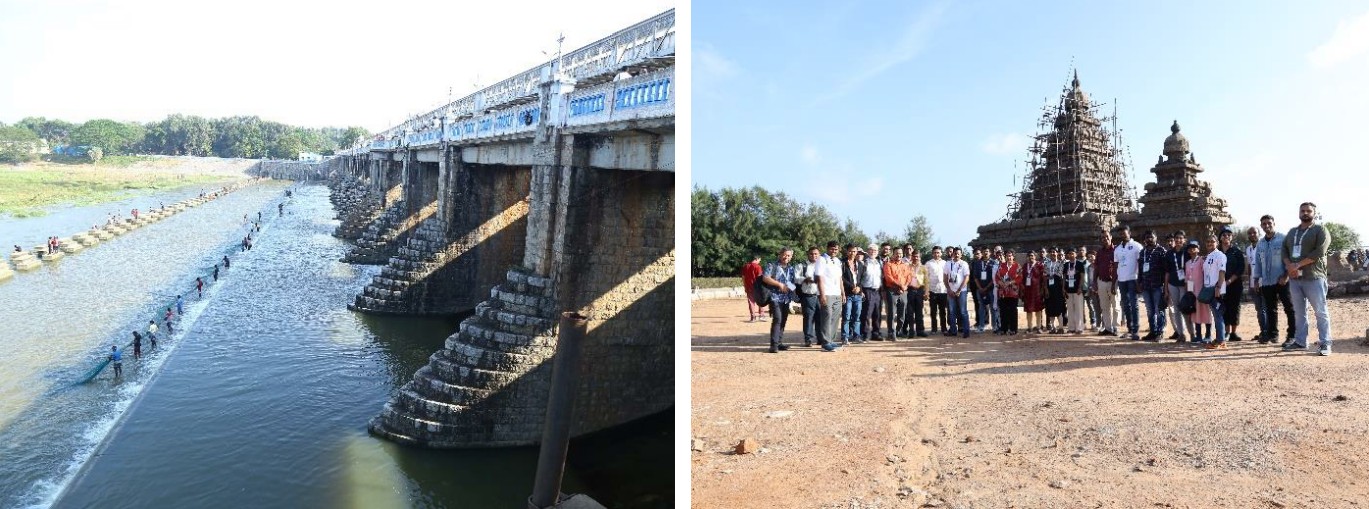
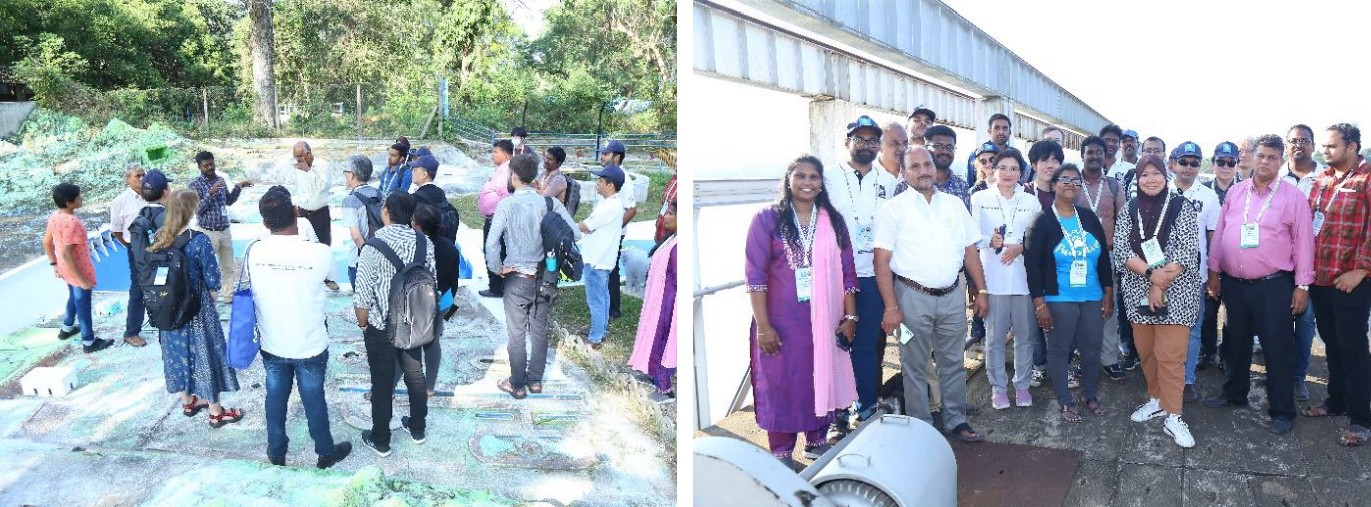
Social Programs
Conference participants were invited to attend the three dinners at the end of each day for a group reflection. The dinners were arranged as follows:
Dinner on 13th December 2022 at 19:00 hours; Venue: IIT Madras
Ice Breaker Dinner on the 14th of December 2022 at 19:00 hours; Venue: Hotel Westin.
Cultural Program and Banquet on the 15th of December 2022 at 19:00 hours; Venue: Hotel Leela Palace. During this event, the IAHR-APD Heritage award was awarded to Kallanai (Grand Anicut), an ancient dam built across the Kaveri River flowing from Tiruchirapalli District to Thanjavur district, Tamil Nadu, India. Further, Prof. Hyoseop Woo, Gwangju Institute of Science and Technology, Korea, was awarded a distinguished IAHR-APD membership.
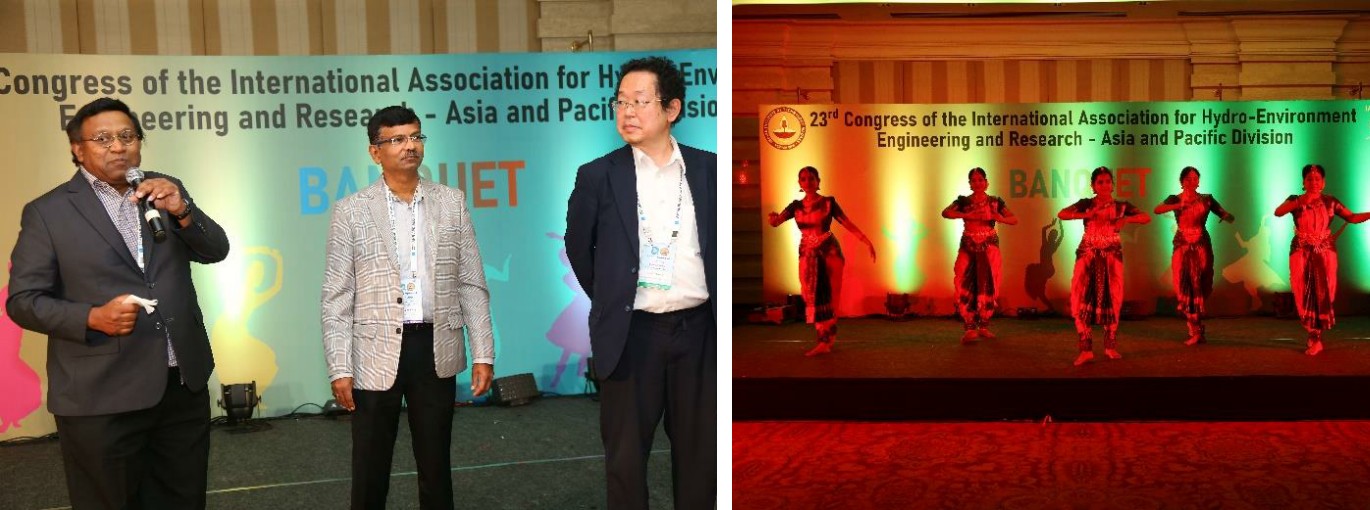
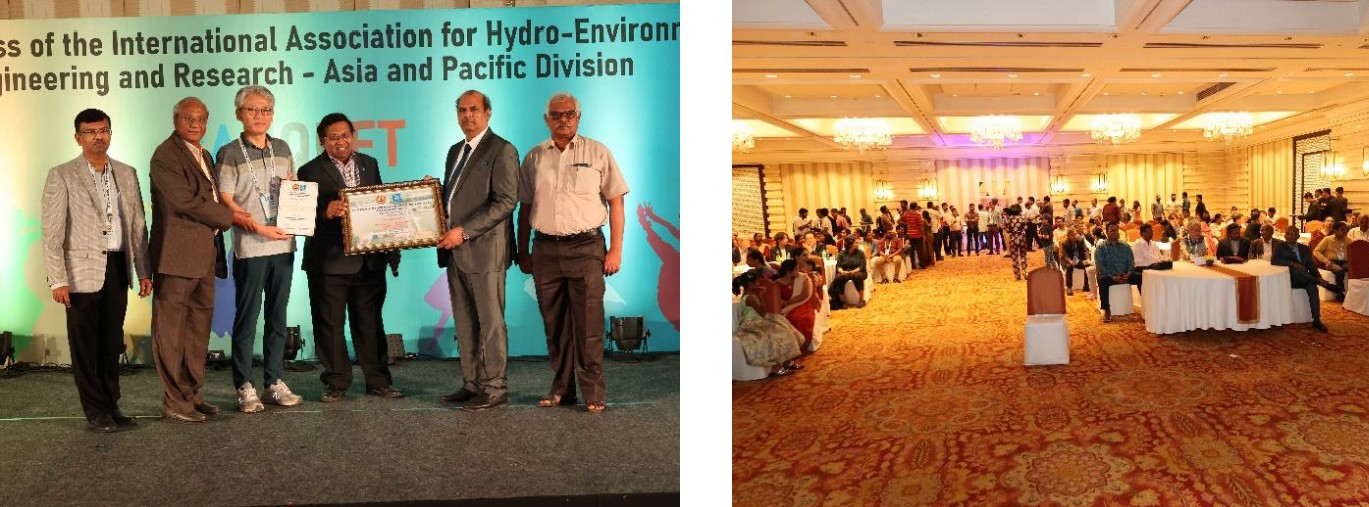
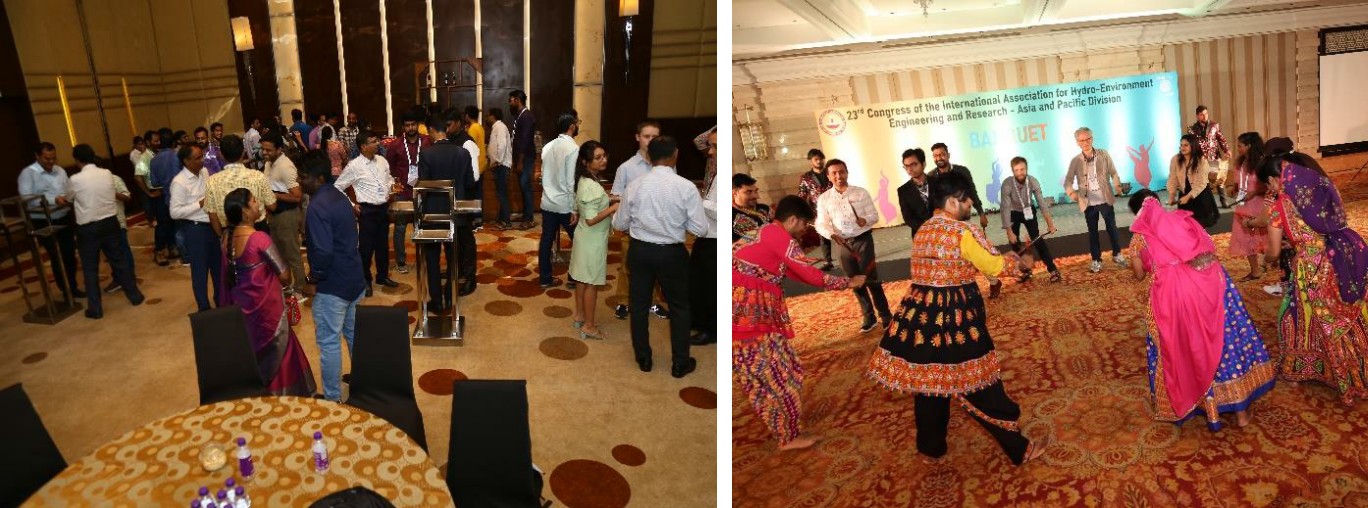
Pre-Conference Workshops
Two pre-event workshops, one on Sustainable Urban Drainage and another on Textile Technology and its application in lieu of climate change, both pertaining to present-day problems, deliberated and came out with specific recommendations for sustainable development and growth.
Workshop on Sustainable Urban Drainage System
A special workshop was organised on the zeroth day of the 23 rd Congress IAHR-APD 2022, which focused on the Sustainable Urban Drainage System (SUDS) that helps to improve living in urban areas. SUDS is designed in such a way it drains the rainwater effectively by devising strategies and structures with minimal environmental damage. It includes flood prevention and protection, water quality enhancement, maintaining natural flow contours, improving aquifer recharging, etc. The 23 rd congress provided a good platform for researchers, academicians, and practising engineers to gather and share their knowledge to address the global water challenges for sustainable development.
The workshop consisted of invited talks by Prof. Balaji Narasimhan (IIT Madras, India), Prof. B. S. Murty (IIT Madras, India) and Prof. Maryam Imani (Anglia Ruskin University, UK) in the morning session. Each presentation lasted 45 minutes, followed by a 15 minute discussion. These talks covered fundamental aspects of SUDS, the challenges to implementation of SUDS in emerging economies such as India and new research problems that need to be addressed in this area. The afternoon session consisted of hand-on-problem solving by groups of two participants in each group. Prof. Maryam Imani and Prof. Sunrita Dhar-Bhattacharjee of Anglia Ruskin University, UK conducted the afternoon activity session. Prof. Maryam Imani participated in the event online.
Workshop on Textile Technology and its application on climate change adaptation
A parallel workshop was organised on Textile Technology and its application in climate change adaptation. Geosynthetic fabrics are artificial materials made up of polymers used for stabilising terrains. These materials find applications in civil, hydraulic, environmental, marine, and coastal engineering. The functions performed by the geosynthetics are filtration, drainage, separation, lining, reinforcement, provision of a fluid barrier, and environmental protection. They are widely used for dewatering, flood control, sediment transport control, and coastal protection. In deepening navigation channels, dredging the subsequent encapsulation of dredged material in geosynthetic containers offers protection for channel banks. In India, polymer products are used in various coastal protection works and beach reclamation structures such as sea walls, bulkheads, breakwaters, and groins. As Geo-synthetic products further prove their utility, river training structures can adopt these materials.
Following are some of the topics which were covered during the workshop:
Fundamental Principles, properties of Geo-synthetics, and international testing standards.
Durability with reference to UV resistance and performance.
Filtration, Drainage, and Erosion Control, Design Approaches.
Role of Geo-synthetics in Engineering Measures for Natural Disasters.
Geo-systems (Geo-tubes, Geo-containers, etc.).
Geosynthetics for sustainable coastal infrastructure.
Case studies for coastal protection and other near-shore structure applications.
Bio shields-vegetation for stability and green fencing.
Construction techniques.
Geo-synthetic applications for multi-functional artificial reefs.
The invited talks were delivered by eminent researchers and scientists from academic and research institutes and industries, namely Prof. Thomas Gries, Dr. Vijaya Ravichandran, Ms. Minimol Korulla etc.
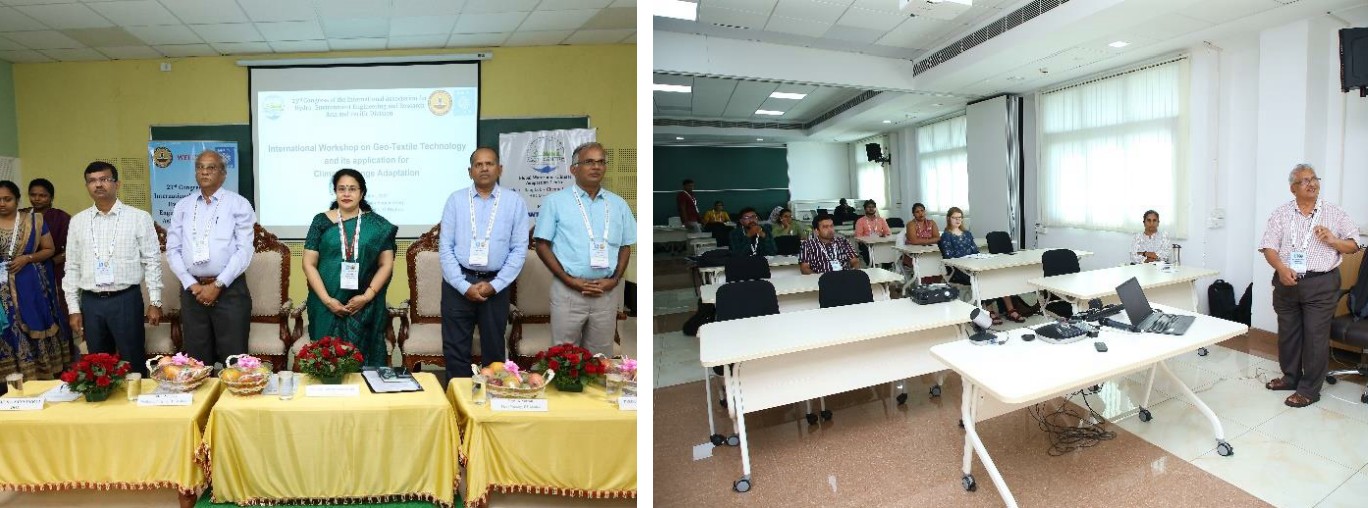
Conference Organizers
Indian Institute of Technology Madras (IIT Madras) hosted the 23rd Congress of the International Association for Hydro-Environment Engineering and Research – Asia and Pacific Division (IAHR-APD 2022) from 14 th to 17 th December 2022. It was jointly organised by the Departments of Ocean Engineering and Civil Engineering with the support of the allied departments of the Institute. Prof. S. A. Sannasiraj, Prof. B. S. Murty and Prof. R. Panner Selvam of IIT Madras are the organising secretaries of this prestigious congress.
Indian Institute of Technology Madras (IITM) was established in 1959 by the Government of India as an 'Institute of National Importance.' The activities of the Institute in various fields of Science and Technology are carried out in 16 academic departments and several advanced interdisciplinary research academic centres. The Institute offers undergraduate and postgraduate programmes leading to B. Tech., M. Sc., M. B. A., M. Tech., M. S., and Ph. D., degrees in various specialisations. IITM is a residential institute with more than 600 faculty and 9,500 students. Students from 18 countries are enrolled here. IITM fosters an active entrepreneurial culture with strong curricular support through the IITM Incubation Cell.
Recognised as an Institution of Eminence (IoE) in 2019, IITM has been ranked No. 1 in the 'Overall' Category for the fourth consecutive year in India Ranking 2022 released by National Institutional Ranking Framework, Ministry of Education, Govt. of India. The Institute has also been ranked No. 1 in the 'Engineering Institutions' category in the same Rankings system for seven consecutive years – from 2016 to 2022. It was also adjudged as the 'Top innovative Institution' in the country in the Atal Ranking of Institutions on Innovation Achievements (ARIIA) in 2019,2020 and 2021. ARIIA Ranking was launched by the Innovation Cell of the Ministry of Education.
It is situated in the south Indian city of Chennai (formerly known as Madras). The Institute is a self-contained, beautiful, green residential campus of about 250 hectares with all the modern amenities and support services. The Department of Ocean Engineering is a centre of excellence in the field of coastal, ocean, port engineering, inland navigation, and sedimentation problems. The Department of Civil Engineering is involved in a variety of problems related to fluid mechanics, hydraulics, water resources and management. They are a perfect combination to organise the congress.